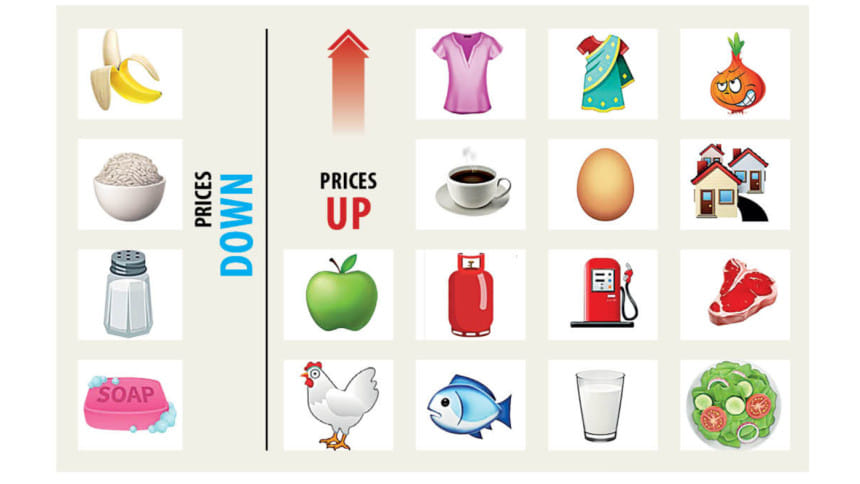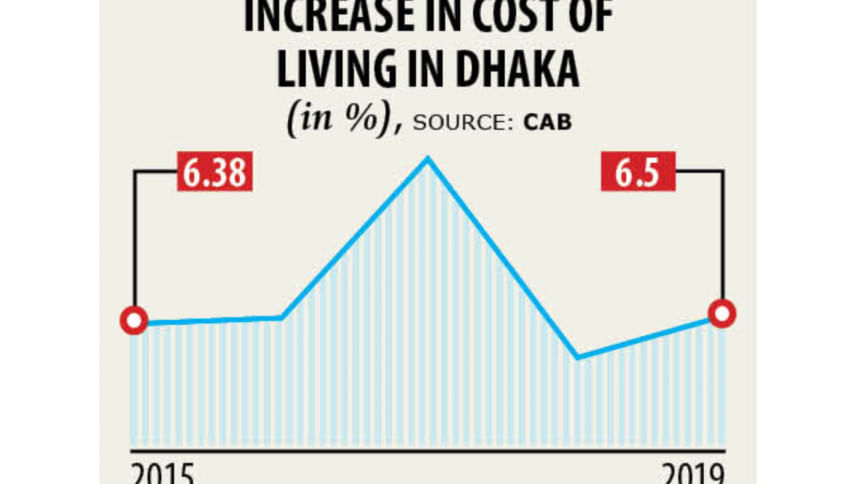Living in Dhaka became 6.5pc dearer last year

Living costs in Dhaka soared 6.5 percent in 2019 on the back of spiralling prices of essential commodities and services, said Consumers Association of Bangladesh (CAB) yesterday.
“There are some ominous signs from the beginning of this year,” said CAB President Ghulam Rahman at a press conference, citing the hike in prices of liquefied petroleum gas cylinder just on the first day of the 2020 and beginning of the process of hike in electricity tariff.
The CAB organised the event at the National Press Club in Dhaka to share its findings on overall increase in living costs based on price data of basket of 114 food items, 22 essential items including clothes, cotton towels and soaps and 14 services such as electricity, gas and house rent in Dhaka city.
It did not factor in the cost of education, healthcare and actual transport in its estimate.
The voluntary and non-profit organisation unveiled the spiral in cost of living at a time when consumers are paying more to buy edible oil, onions, chicken, powder milk and sugar over the last couple of weeks.
“Soaring prices of commodities are badly affecting the lives of people,” Rahman said.
The government’s failure to contain the prices of the essential spices and onion gave courage to dishonest businesses in other trades.
“That is why, we see a tendency to create instability in the prices of commodities. Businesses or others can do that.”
He urged the government to pin down those who are trying to create volatility in the market by increasing the prices for no reason and bring those under the law to ensure visible punishment.
The cost of goods and services edged up one percentage point year-on year to 6.08 percent last year from 2018, thanks to increasing prices of onions and other spices, vegetables, fish, meat, milk, tea, clothes, house rents and piped water. The only respite for people was the fall in overall prices of rice, pulse, edible oil, sugar and soap in 2019 from the previous year.

Yet, the increasing house rent has put higher pressure on the poor and low-income people. “The lower the income, the higher the pressure of house rent on them,” said Rahman, adding that the rent of a two-room shed registered the highest climb of 10 percent, followed by tin shed buildings.
The living standard of those consumers whose income did not increase deteriorated. “They have fallen in difficulty,” he said.
Still, nearly two crore of Bangladesh’s population are poor and the majority belong to the poor and low- income group, according to CAB.
“The increase in prices of commodities affect them,” he said, while calling for the prices of goods and services to be contained to improve the standards of living of the poor. At the same time, steps should be taken so that their income grows.
Onion was the most talked about essential and its prices shot up as much as 50 percent year-on-year in 2019 from a year earlier, CAB said.
The prices of vegetables soared 81.3 percent with pointed gourd rising the most. At the event, CAB Energy Adviser Shamsul Alam said the prices of LPG cylinder were hiked again this month after increasing in November last year.
And the government plans to revise the law pertaining to increasing the prices of electricity and energy: the prices can be hiked any time of the year from once a year.
“We, the consumers, are victims of injustice in case of electricity and energy,” he said, adding that CAB was against the hike in prices of electricity.
CAB said it presented data and argued against the move to increase prices in a hearing recently.
“Illogical hike in prices of electricity will have a negative impact on the economy and the lives of consumers,” he said, adding that the prices of goods will increase, which will erode the competitiveness of Bangladesh’s exports in the world market.
The CAB president also urged the government to take steps to improve the standard of medical care in Bangladesh by establishing a healthcare town and encouraging private and foreign investment there.
“When our higher ups will stop going abroad for treatment we will think that standards of healthcare have improved in Bangladesh.”
Rahman also criticised the public hospitals for not using healthcare-related equipment and machines purchased by state money.
“It is unacceptable,” he added.
CAB General Secretary Humayun Kabir Bhuiyan was also present, among others.

 For all latest news, follow The Daily Star's Google News channel.
For all latest news, follow The Daily Star's Google News channel. 



Comments